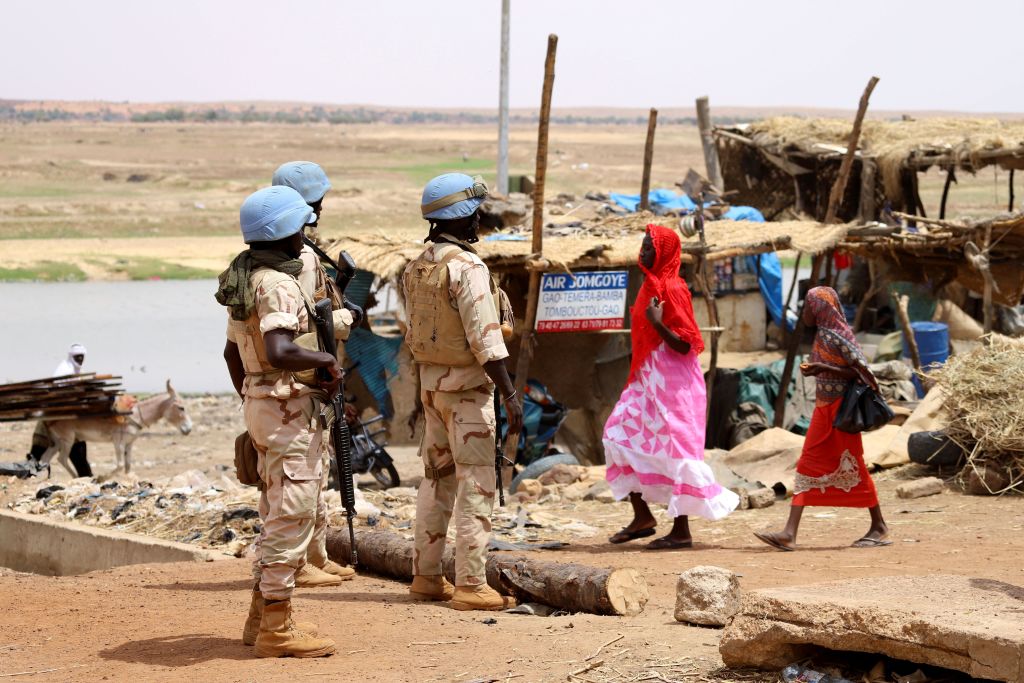‘We Cannot Describe the Horror’: Violence in Mali Surges as MINUSMA Withdraws
ADF STAFF
Shouting and gunfire filled the air on an August night in the central Malian farming village of Bujo. Mostly unarmed, Bujo’s residents had to flee to survive the sudden attack.
By morning, 17 villagers were dead. Terrorists torched their homes, stole their livestock and looted their stores. Survivors buried victims in a communal graveyard, then walked 15 kilometers to the town of Bandiagara.
The terrorist attack was one of more than a dozen assaults that killed at least 100 people and displaced tens of thousands in central Mali in August.
“We are really completely lost,” Wilas Bujo, a farmer who fled Bujo with 13 relatives, told The Guardian. “We need food, shelter, everything. We want to go home to our village but there is no one to keep us safe there.”
Violence has escalated in Mali since the United Nations Multidimensional Integrated Stabilization Mission in Mali (MINUSMA) began withdrawing troops from the country.
According to the Armed Conflict Location & Event Data Project (ACLED), more than 650 people died in Mali between July, when the first phase of MINUSMA’s withdrawal began, and August, a more than 40% rise over the previous two months.
Militants linked to al-Qaida are active in central Mali, while Mali’s army struggles to quell Tuareg rebels in the north, where attacks have spread to new locations amid joint operations conducted by the military and Russia’s Wagner Group.
Insurgents tied to the Islamic State group (IS) wreak havoc in the east. The United Nations reported in August that the IS nearly doubled its territory in Mali in less than a year.
Much of the violence involves battles between Malian forces, including members of the Wagner group and terrorist organizations, while groups linked to the IS and al-Qaida also fight among themselves. Attacks on civilians are also increasing.
Residents in central Timbuktu, which was occupied by extremists a decade ago, again find themselves living in a battleground. In August, the al-Qaida-linked Jama’at Nusrat al-Islam wal Muslimin (JNIM) shut off river and air routes.
A September bombing attack hit a hospital, killing two children, and landed near a school where survivors of a boat attack that killed more than 100 people were sheltering.
JNIM conducted six bomb attacks between mid-August and late September, including a September 11 attack that caused flights to and from central Timbuktu to be suspended, ACLED reported.
“Our worry is the shelling,” Sory Touré, a businessman in Timbuktu, told Reuters. “It creates a real psychosis and leaves a lasting impression. I have this fear within me.”
Aicha Sababou survived the passenger boat attack perpetrated by JNIM on the Niger River in northern Mali. The attack killed 49 civilians, 15 Malian Soldiers and dozens of JNIM fighters. The terrorists attacked a military base in northern Mali the same day.
“We cannot describe the horror,” Sababou told Reuters. “Seeing dozens of people die and burying them together is scary. We are happy to rejoin our families even if there are still wounds we need to heal.”
The river boat attack occurred as violence against civilians soared. Mali experienced a 38% increase in civilian attacks from January to late September compared to the same period in 2022, ACLED reported.
The Wagner group, which entered the country in 2021, is blamed for much of the violence against civilians. According to ACLED, 71% of Wagner’s engagement in political violence in Mali has taken the form of attacks targeting civilians.
MINUSMA forces totaling nearly 13,000 are expected to be gone by December 31. In early October, the withdrawal of 116 Senegalese peacekeepers meant that 3,200 peacekeepers have left the mission, defenceWeb reported.


Comments are closed.